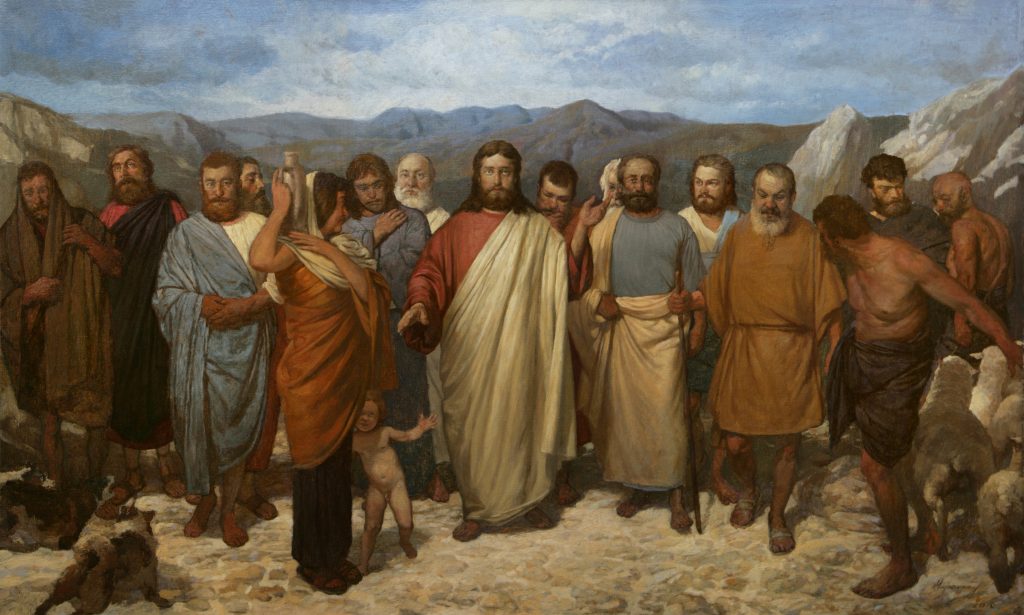by Sarah Brock
Today’s Readings:
AM Psalm 25 PM Psalm 9, 15
Isaiah 44:6-8, 21-23; Ephesians 4:1-16
Making friends is easy. I have hundreds of them. Or, at least that’s what my social media accounts tell me. But, I must admit, most of these friends were not chosen with intention. They were added with the quick click of a button and not much thought. I can’t help but wonder, in the world of social media where friends have become a disposable commodity, what is the purpose of friendship?
In today’s reading from Mark, Jesus selects friends from among his followers. He “went up the mountain and called to him those whom he wanted, and they came to him” (3:13). These twelve men will become his closest companions and trusted colleagues who share in his life and work. There are a couple of things that jump out at me in the way that Jesus chooses these friends, that stand in stark contrast to our contemporary practice of ‘friending.’
Jesus chooses the twelve with intention. They are not the first twelve people he meets or invites to follow him. He already has a multitude of individuals following or traveling from a distance to see him. They are also not men that he has just met. These twelve have already begun following him at his invitation, leaving behind their homes, families and friends, and work to witness Jesus. And, they are not twelve men with backgrounds and perspectives that are identical to Jesus himself. They represent a variety of former occupations, social statuses, and economic brackets, embodying a little of the diversity of the communities to which they will journey.
Additionally, Jesus chooses these men, not just to follow along and agree with him, but to share in his life, authority, and work. His purpose in selecting friends is not simply to provide fun and emotional support. Jesus surrounds himself with friends who will both challenge and support him. And, in naming them apostles, it is clearly his intention to challenge, mentor, and support them as they also become leaders and teachers.
Today, as we remember the life and work of Rev. Dr. Martin Luther King, Jr., I’m reminded of yet another important consideration in regards to developing friendships. And, this is one that I believe Jesus also demonstrates. That is to create what Dr. King refers to as the ‘beloved community.’ Not an unachievable dream world where disagreement is nonexistent, but a community where justice and peace prevail when adversaries strive for reconciliation. A world where conflict is resolved through the spirit of friendship rather than violence. It was Dr. King’s strong belief that “the nonviolent resister does not seek to humiliate or defeat the opponent but to win his friendship and understanding.”1 Martin Luther King, Jr. strived for this friendship throughout his life of activism, based on the life and relationships of Jesus.
The relationship between Jesus and Matthew, for example, jumps out as precisely this type of friendship as Dr. King describes. As a tax collector, Matthew would be despised in the Jewish community and represented much of the corruption Jesus opposed. Yet, Jesus chooses his friendship despite such notable differences, seemingly seeking the opportunity for dialogue and striving toward a beloved community.
It is this last consideration of friendship that strikes me as most lacking in our current social climate. When it is so easy to ‘unfriend’ individuals with whom we disagree, why bother engaging in dialogue seeking understanding of the other? Why not simply surround ourselves with people who share our same political, religious, and social beliefs? Why devote time and energy to relationships that challenge our own worldview? The polarization of our nation is calling us to return to increased intentionality in friendship. To choose our friends, not simply with a quick click of the mouse, but with care. To choose friends to challenge, strengthen, and share our life’s work. To choose friends with whom we will strive toward Dr. King’s beloved community.
Sarah Brock is a postulant in the Diocese of Massachusetts and lives in Boston.
1 Martin Luther King, Jr., “The Power of Non-Violence”, accessed January 15, 2017, http://teachingamericanhistory.org/library/document/the-power-of-non-violence/.
Image Credit: By Andrey Mironov, from Wikimedia

